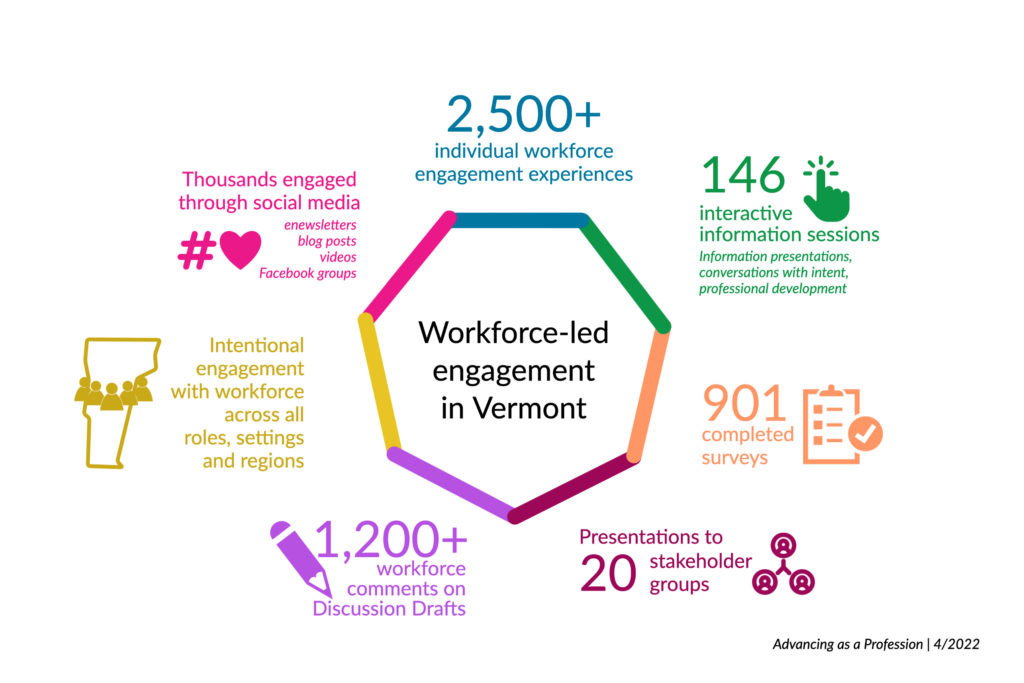The Early Childhood Education Profession
Attend an upcoming Roundtable Updates: Establishing an ECE Profession in Vermont
It's time for early childhood education to be a well-prepared, well-compensated profession.
We seek professional recognition for early childhood educators from the State of Vermont.
Our vision for the ECE Profession: That each and every child, beginning at birth, has the opportunity to benefit from high-quality, affordable early childhood education, delivered by an effective, diverse, well-prepared, and well-compensated workforce.
Creating a Profession Aligned With Our Vision

Next Steps In Vermont
In 2025, Vermont’s Office of Professional Regulation (OPR) recommended to Legislators that Vermont recognize early childhood educators as professionals, in alignment with our recommendations and the future national profession.

A National Profession
Our recommendations align with the national Unifying Framework for the Early Childhood Education Profession.
We collaborate with the national Commission on Professional Excellence in Early Childhood Education, which views Vermont’s work as a model for other states.

Nothing About Us Without Us
We are led by a Task Force of home, center, and school-based early childhood educators from across the state. We will advocate for policies that support the educators currently working in our mixed-delivery system.

How Will This Affect Me?
- How will today’s workforce be supported as qualifications change?
- How will this work with current systems?
- How long will this take?
- How does this impact our workforce shortage?

Already Involved?
Next Steps and Resources
- Attend Roundtable Updates: ECE workforce members, register here for the latest updates and contribute to the discussion
- Review Our Recommendations: Workforce-approved components of the ECE Profession, and supports for today’s workforce
- Read the OPR Report: Vermont’s Office of Professional Regulation (OPR) recommends professional recognition and phased-in implementation, aligned with our recommendations
- Read the Explainer: “The Need for a Comprehensive Range of Licenses to Practice ECE”
- Claim Your Identity: Get started with our Professional Identity Toolkit
- See our latest update about the ECE Profession
- Ready to step up as an advocate for our shared vision of an ECE profession? Subscribe or manage your preferences to receive calls to action
Getting Up to Speed? Start Here!
VTAEYC supports the recommendations of Vermont’s Office of Professional Regulation for creating a professional license to practice for early childhood educators. These recommendations align with the recommendations supported by our workforce.
More than 1,000 Vermont early childhood educators helped shape our recommendations for an ECE Profession.
In addition to our workforce, we work closely with state agencies, organizational partners, higher ed, and the national commission.
See our recommendations for components of an ECE Profession in Vermont, and for how we can support our workforce through implementation.

Project Leadership
This initiative is led by a Task Force of Vermont early childhood educators; resourced by a Core Team of stakeholders, funders, and consultants; supported by Design Teams; and energized by an engaged workforce.

Project Timeline
Since 2018, more than 1,000 early childhood educators have contributed to our shared vision of an ECE profession.

Resources
Includes explainers, social media posts, flyers, toolkits, Consensus Documents, videos, Professional Development recordings and recaps, links to publications, and more.
What Can I Do?
Stay engaged with ongoing professional development and informational opportunities.

Roundtable Updates
Roundtable Updates are conversational, live 45 minute updates offered every second Tuesday of the month at 12:30 PM throughout the legislative session. They keep early childhood educators informed about progress in the work to establish an ECE Profession in Vermont, and invite workforce feedback.
Roundtable Updates are scheduled for February 11, March 11, April 8, May 13, June 10, 2025.

Getting Up To Speed
These updates are designed for early childhood educators new to the work to advance as a profession. Learn:
- What it means to be a profession
- How and why Vermont early childhood educators led the workforce consensus process on recommendations for creating a profession
- What's happening next
What Can I Do Next?
Subscribe, share the Unifying Framework with your teaching community, and attend the next Roundtable Update.
